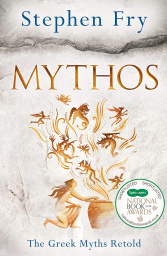Mythos: The Greek Myths Retold
Revision as of 10:23, 29 January 2020 by TheAlmightyGuru (talk | contribs)
Mythos: The Greek Myths Retold is a book about Greek mythology written by Stephen Fry first published on 2017-11-02. In the book, Fry tells dozens of Greek religious stories in his own words.
I started this book not only because I wanted to learn more about Greek mythology, but also because I love Stephen Fry's work. I finished the audio book on 2020-01-29.
Status
I don't own this book, but I've listened to the audio book.
Review
Good
- Stephen Fry is quite witty all throughout the book.
- I enjoy how Fry explains how various words, phrases, and later cultural elements are based on the various names of the divine beings in Greek mythology.
- Fry includes several variants of stories which, in addition to giving a more rounded understanding of the story, also reminds us how mutable history can be.
- Fry does a great job performing on the audiobook.
Bad
- Most of the stories aren't interesting, which isn't Fry's fault; he had to work with poor source material. The characters in Greek mythology (gods, goddesses, heroes, and heroines alike) are monstrous people (rapists, murderers, spiteful, jealous, superficial, juvenile, etc.). The stories that aren't disjointed and macabre are childish just-so fairy tales. How many times will the supposedly hyper-intelligent gods fall for the "promise to grant my wish before I tell you what it is," trick? How many times will mortals challenge a god at a task knowing full-well the gods won't follow the rules and will exact horrific punishment on them when they lose? Tragedy doesn't work if you don't care about the person who dies. Romance doesn't work if it's based entirely on looks. I just don't get much enjoyment out of the stories, even when jazzed up by Fry. In the afterward, Fry defends the capriciousness of the myth's characters pointing out rightly that they are all made in the image of humans, but I like to read fiction to escape the horrors that people commit, not be reminded of them.
- Fry incorrectly states that there is evidence for a near-global flood, which is why both the Greeks and Hebrews have a deluge myth around the same time. I'm assuming he means mythological "evidence," as in, many mythologies include a deluge, because there isn't any geological (i.e., real) evidence of a global flood. While Christian apologists no doubt love this statement, but a reasonable explanation is that floods are common natural disasters, and even an average-sized flood would seem to cover the whole world to ancient people. Fry is an staunch atheist, so I'm assuming this and his other suggestions that the myths are real or strangely coincidental are meant to be tongue-in-cheek, but I find them a bit annoying.
- Fry tends to romanticize a bit more than is necessary. For example, he acknowledges that some historians have suggested that the author who originally came up with Argus having 100 eyes may have been speaking metaphorically — as in, he was so perceptive, it was as though he had 100 eyes — but then refuses to accept this and says resolutely, and without evidence, that the author literally meant Argus had 100 eyes.
- Fry uses a fair amount of anachronisms having the gods use modern phrases and idioms. He mostly does this for comedic effect, but a lot of the jokes didn't land with me.
Ugly
- Nothing.






